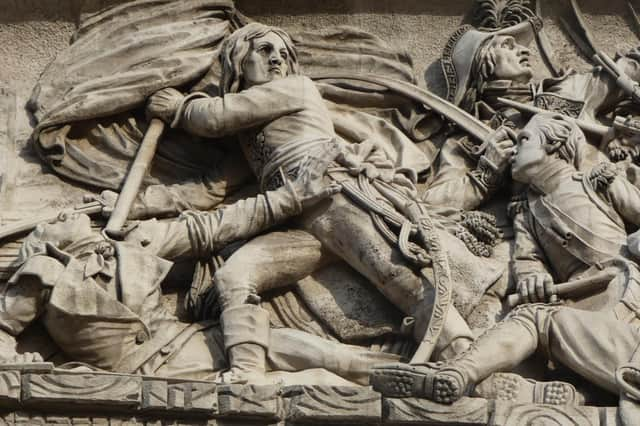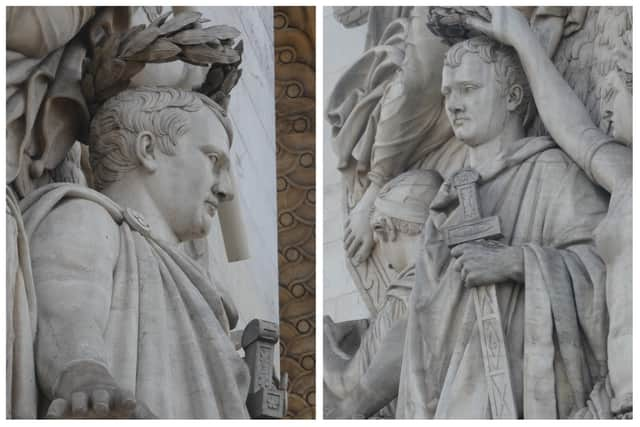Forgotten Local Histories: Warwickshire's Bertie Greatheed in Paris and the Outbreak of the Napoleonic Wars


A return to the Tuileries
On Sunday 13 March 1803, Bertie Greatheed was present at an event that epitomised the deterioration in the relationship between Britain and France since they had signed the peace of Amiens twelve months previously.
Greatheed was attending an audience at the Tuileries Palace, Paris (which was located adjacent to the western facade of the Louvre and unfortunately destroyed in 1871). Present in the chamber were ambassadors, officials, visitors, and Napoleon Bonaparte himself.


Advertisement
Hide AdAdvertisement
Hide AdAfter circling the room, talking to those present, including the British ambassador (Lord Whitworth), Bonaparte suddenly turned and made a beeline straight for the representative from the court of St James.
Bonaparte then proceeded to give Whitworth a lengthy, and very public, dressing down about Britain’s failure to adhere fully to the terms of the Treaty of Amiens.
Greatheed was not standing close enough to hear Bonaparte’s exact words, but he could see that whilst Bonaparte ‘stood talking his eyes roved about the room, [and] he rolled [his weight] from leg to leg and gave threatening shakes of the head’.
The wrath of Bonaparte
Bonaparte’s outburst at Whitworth was not an atypical occurrence. Indeed, shouting at ambassadors would become a semi-regular feature of Napoleon’s approach to diplomacy.
Advertisement
Hide AdAdvertisement
Hide AdAnother notable example is Napoleon’s loud lecture to the Russian Ambassador at the Tuileries Palace in August 1811, where the humiliated victim of the tirade was left looking like a fish gasping for air whilst trying (and failing) to get a word in edgeways.
It would be understandable to interpret the Whitworth incident as a key flashpoint in the build up to war between Britain and France. Whilst outbursts towards foreign dignitaries were not necessarily rare, they were also hardly a signal of a harmonious relationship.
However, the event was more an example of pre-existing tensions between the two nations, rather than a specific escalation.
The truth was, since the Treaty of Amiens was signed, neither side had overexerted themselves trying to maintain peace.
A peace destined for failure?
Advertisement
Hide AdAdvertisement
Hide AdThe French failed to realise that their foreign policy on the continent, including the annexation of Piedmont and the stationing of troops in Switzerland, would do little to endear themselves to the British, who feared French hegemony in the Mediterranean.
British nervousness would only increase as France also continued to pursue its interests in the Middle East and Egypt.
The consequence of British distrust was their failure to adhere fully to the terms of the Treaty of Amiens. Specifically, their commitment to remove their troops from the island of Malta.
This particularly rankled with the French and it was this failure to remove troops from the island that sparked Bonaparte’s outburst against Whitworth.
Advertisement
Hide AdAdvertisement
Hide AdIn addition, the British government’s seemingly hypocritical approach to policing journalists (punishing pro-French, whilst ignoring anti-French, writers), in spite of French diplomatic protests, caused consternation in Paris.
The resumption of war
Lying underneath all of this was a tension between the two countries borne from the more-or-less continuous conflict between them since 1792 (although some historians say that the Napoleonic wars was the concluding chapter of the Second Hundred Years War), as well as a lack of any serious attempt to understand the motives and intentions of the other side.
Seen in the wider context of the Anglo-French relationship between 1802-3, the Whitworth incident was a public example of the overall deterioration in the relationship, but it was not in of itself a major contributing factor on the path that resulted in the renewal of war.
In any case, and contrary to popular belief, it was the British, not Bonaparte, who broke rank first and declared war on 18 May 1803.
Advertisement
Hide AdAdvertisement
Hide AdThe French would issue their own declaration four days later, along with declaring all British citizens then in French territory as prisoners of war. This included Bertie Greatheed and his family.
Unlike many other Britons, the Greatheeds chose to remain in Paris for several months after the declaration of war, principally so that Bertie Jr. could complete his artistic studies.
Greatheed’s last months in Paris
Nevertheless, and somewhat unsurprisingly, the family’s final months in France would prove to be a stressful experience. For example, Bertie Sr. was unexpectedly summoned to a Parisian police station on 4 June but was released as a case of mistaken identity.
More dramatically, the Greatheeds’ house was raided and ‘searched from top to bottom’ on 24 June (though the police were said to be ‘very civil’). A reason was never given for the search.
Advertisement
Hide AdAdvertisement
Hide AdThe uncertain times continued until October 1803 when, on Wednesday 12, the Greatheeds left Paris ‘a little before two’, bound for Dresden.
Sadly, Bertie Jr would not see Britain at peace again. He died in Vicenza, Italy in October 1804, having contracted influenza. He was 23.
The Napoleonic Wars would continue for another eleven years (with a circa 12-month interlude from Napoleon’s first abdication to his Hundred Days campaign, culminating in the battle of Waterloo).
Author’s Note: Further reading suggestions for the Franco-British relationship in the build up to war include M. Broers, Napoleon: Soldier of Destiny (2015) and P. Dwyer, Citizen Emperor: Napoleon in Power (2014).